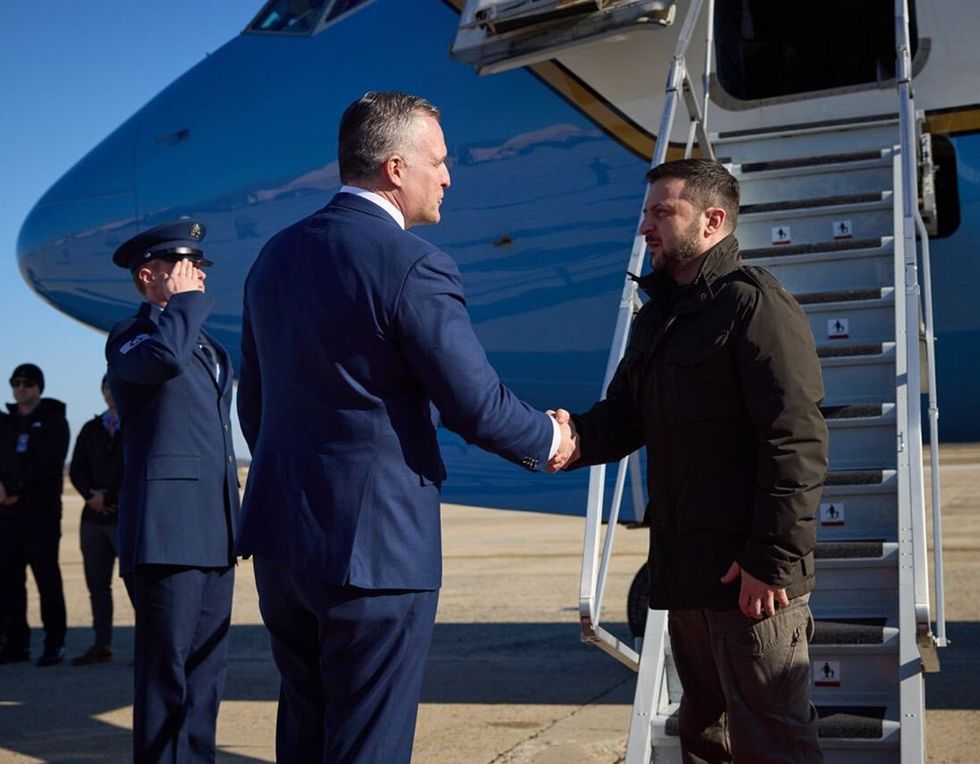In a heated Oval Office meeting today, President Donald Trump’ and Vice President JD Vance berated Ukrainian President Volodymyr Zelenskyy, accusing him of disrespect and threatening to withdraw U.S. support if he doesn't pursue peace with Russia.
Rufus Gifford, former U.S. ambassador to Denmark and chief of protocol for the U.S. State Department expressed his dismay: "It's shameful and embarrassing as an American. This is a wartime president. Imagine if FDR had invited a leader under siege and shamed him in the Oval Office. It's a profound moral shortcoming, starkly revealing Trump's lack of moral compass."
Keep up with the latest in LGBTQ+ news and politics. Sign up for The Advocate's email newsletter.
Gifford has been closely watching the global upheaval being caused by Trump’s disastrous and extreme nationalistic foreign policy. He also continues to have a special place in his heart for Ukraine and its president, Volodymyr Zelenskyy.
Gifford shared with me a revealing moment about Zelenskyy's character during a high-stakes diplomatic encounter in Hiroshima while he worked for the State Department. As world leaders gathered for critical discussions, Zelenskyy found himself waiting for a meeting with President Joe Biden, who was running behind schedule.
“I had to go in and tell him that President Biden needed a little more time,” Gifford recalled. “He just looked at me, smiled, and said, ‘Rufus, I don’t even get a moment’s rest at home.’”
Standing in a hotel suite high above Hiroshima Bay, with the ocean stretching endlessly before him, Zelenskyy allowed himself a brief moment of reflection. “If I can just sit in this chair, stare out at the ocean for a few minutes, and forget everything, just for a moment, I feel lucky,” he told Gifford. “And I will wait as long as I need to wait for the president of the United States.”
For Gifford, the exchange underscored Zelenskyy’s deep understanding of the stakes. “It speaks to how he views the United States,” he said. “He knows how important we are. For him, this is life or death, for his people, and for his country. And he was never a grandstander. He was sincere. He had a mission, and he wanted to tell the story.”
"He wasn’t just preparing for another diplomatic meeting. He was making the case for his country’s survival. It was humbling to witness, and it underscored how critical U.S. support is for Ukraine’s future."
 Chief of Protocol for the U.S. State Department Rufus Gifford greets Ukrainian President Volodymyr ZelenskyyCourtesy Ukranian Embassy
Chief of Protocol for the U.S. State Department Rufus Gifford greets Ukrainian President Volodymyr ZelenskyyCourtesy Ukranian Embassy
In just over a month, with Ukraine and Trump’s treatment of Zelenskyy as an example, the United States has gone from a global leader to an international pariah. That, at least, is the assessment of Ambassador Gifford, who warns that the damage inflicted on America’s global standing under the Trump administration may be irreversible.
“It started with shock,” Gifford explained. “At first, there was a sense of, how much of this is bluster and how much of it is real? And that was especially true when Trump floated the idea of ‘taking over’ Greenland. At first, there were laughs, but when he doubled down, that shock turned into anger.”
That anger, Gifford says, quickly spread beyond Denmark, where he once served as U.S. ambassador, to Canada and across Western Europe. “It’s moved beyond anger now,” he warned. “There’s something much more tragic happening, and that is our allies are legitimately questioning whether the United States will ever be there for them again.”
This is the moment, Gifford argues, that should terrify Americans. “Americans are going to learn really quickly what it’s like to be politically isolated. We are burning bridges with our best friends. And let’s be clear: Russia and Saudi Arabia will never be our real friends. These are transactional relationships at best.”
Since the end of World War II, the United States has defined itself as a moral leader of the West, promoting peace and prosperity. That standing has been shaken before, but, as Gifford stresses, “there has been nothing like this since the end of World War II. This is an existential crisis.”
Gifford insists that defending the values that have kept the world stable requires urgent action. “This isn’t a Republican or Democratic issue. Historically, Republicans led the charge in defending democracy. But we’ve lost our way. We need to reclaim our role, and that will take enormous effort, humility, and a willingness to fight for what we believe in.”
Diplomatically, Gifford warns that Americans will feel the consequences of Trump’s foreign policy failures in their daily lives. “We’re already seeing signs of boycotts against the United States,” he said. “That means a hit to our tourism industry. The summer travel season is coming up, and there’s anecdotal evidence that Europeans and Canadians are canceling their trips here.”
Beyond tourism, trade disruptions could hit American wallets. “Companies in Canada and Europe that historically imported goods from the U.S. are now looking for alternative suppliers. When Trump threatens tariffs, those companies don’t just wait, they change their supply chains. That will impact Americans’ pocketbooks directly.”
 TK CAPTIONshutterstock creative
TK CAPTIONshutterstock creative
But for Gifford, the deeper wound is to America’s identity. “When I see the U.S. national anthem being booed in Canada, when I hear similar stories from Europe, it breaks my heart. The world has loved to hate us in some ways, but at the end of the day, we were still the moral leader. Now that’s slipping away.”
Moral leadership, Gifford argues, isn’t about making every decision based on immediate financial return. “It’s about goodwill. It’s about the benefits that come from global respect. That’s why, when I was ambassador, I could ask Denmark to help fight Ebola in Africa or remove chemical weapons from Syria, and they would say yes, and not because it was their fight, but because we led.”
Now, Gifford warns, the answer may not be yes. “It’s going to be harder for allies to stand by us. That means more isolation. Even the richest and most powerful country on Earth cannot act alone. The world is too complex, and there are adversaries, Russia, China for example, that are eager to step into the leadership void we’re creating.”
The consequences, he says, are already playing out. “Trump claims to be a master negotiator, but we’re watching him surrender leverage on the world stage. The upcoming summit in Saudi Arabia? Russia is calling the shots. We’re giving up our position without even a fight.”
Despite his concerns, Gifford remains hopeful. “I think Republicans are starting to get scared. Look at the conservative town halls. Republican lawmakers are getting hammered by their own constituents. That’s how change happens.”
Pointing to Trump’s declining approval ratings, Gifford sees a path forward. “I’ve felt disempowered and depressed over the last month, but when I see those numbers, I realize we still have a chance. We have to share our stories, speak out, and fight for what we know is right.”
For Gifford, the question isn’t just about America’s relationships with other countries. It’s about America’s relationship with itself. “Historically, we’ve been the good guys. Now more and more people are rooting against us. Do we accept that, or do we fight to be the nation we once were? That’s the choice we face.”


 Chief of Protocol for the U.S. State Department Rufus Gifford greets Ukrainian President Volodymyr ZelenskyyCourtesy Ukranian Embassy
Chief of Protocol for the U.S. State Department Rufus Gifford greets Ukrainian President Volodymyr ZelenskyyCourtesy Ukranian Embassy TK CAPTIONshutterstock creative
TK CAPTIONshutterstock creative


































































Charlie Kirk DID say stoning gay people was the 'perfect law' — and these other heinous quotes